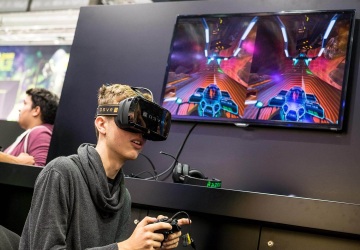The virtual reality (VR) world has undergone significant changes in the last few years, primarily propelled by advancements in VR gaming gadgets. These innovations promise unparalleled immersion, striking graphics, and an enriching gaming experience. Let's dive deep into what these cutting-edge gadgets bring to the table.
1. Unprecedented Level of Immersion
The hallmark of any VR device is its degree of immersion, plunging gamers into alternative realities with unparalleled depth.
·Depth Tracking: The latest VR gaming gadgets utilize intricate depth-tracking systems. They pinpoint not just the position of the player's head but also the distance from objects in the game, enabling interaction with the environment in more intuitive ways.
·Hand and Finger Tracking: While older systems relied on controllers, current-gen VR gadgets offer meticulous hand and finger tracking, allowing players to grip, grasp, and manipulate objects in the virtual world seamlessly.
·Field of View: An expanded field of view (FoV) in the latest devices envelops gamers in 360-degree vistas, ensuring every glance and turn feels natural and expansive.

2. Graphics: Beyond Reality
The heart and soul of VR's allure lie in its graphics. The lifelike rendering of the gaming world is crucial in bridging the gap between Reality and the virtual realm.
·Resolution and Refresh Rate: Newer VR gadgets boast higher resolutions, making every texture, shadow, and light source appear realistic. Coupled with higher refresh rates, this ensures smoother animations and transitions, free of lag or ghosting.
·Ray Tracing: A term commonly associated with top-tier gaming, ray tracing in VR promises real-time lighting, reflections, and shadows, delivering cinematic quality to the gaming environment.
·Dynamic Environments: The landscapes in the latest VR games are not static wallpapers but active entities. Trees sway, water flows, and shadows move with the time of day, lending an ever-changing ambiance.
3. Experience: A Multisensory Adventure
Beyond visual splendor, the latest VR gaming gadgets focus on a holistic experience, engaging multiple senses for an all-encompassing adventure.
·Haptic Feedback: Gone are the days when vibrations in a controller were the only physical feedback. Advanced haptic suits and gloves relay sensations, from the abrasion of an arrow to the warmth of a virtual sun, directly onto the gamer's body.
·3D Audio: Precise spatial audio solutions ensure players can hear sounds from specific directions, heightening the sense of presence. Sound plays a pivotal role in VR immersion, whether it's the whisper of an enemy or the rustle of leaves.
·Smell and Taste: Experimental at the moment, there are endeavors to integrate smell and even taste into VR. Imagine the aroma of a forest or the saltiness of virtual seawater.
4. Social Integration and Shared Worlds
One significant evolution in VR is the emphasis on shared experiences. Modern VR isn't an isolated venture; it's a communal journey.

·MMO-VR: Massively Multiplayer Online VR games are burgeoning. They offer vast shared worlds where players can meet, interact, and embark on adventures together, redefining social gaming.
·Real-time Facial Expression Mapping: Recent VR gaming gadgets can map a player's facial expressions onto their in-game avatar, allowing for non-verbal communication in the virtual realm.
5. Portable and Wireless Solutions
The quest for freedom of movement has led to the development of more portable and wireless VR solutions. Gamers are no longer tethered to powerful PCs but can experience high-end VR gaming on standalone devices.
·Battery Life and Cooling: As gadgets go wireless, battery longevity and efficient cooling mechanisms become paramount, ensuring prolonged play sessions without overheating.
·Cloud Gaming Integration: The synergy between cloud gaming and VR suggests a future where high-end VR games can be streamed directly to devices, bypassing bulky hardware.
6. Advanced Motion Capture and Real-world Integration
The blend between the real and virtual worlds is becoming thinner.
·Full Body Motion Capture: Earlier VR gadgets relied heavily on head and hand positions. Full-body motion capture ensures that every move, from a subtle shuffle to a high kick, is replicated in the virtual realm.
·Real-world Mapping: VR systems can now scan and integrate the player's natural environment. This means you could turn your living room into a virtual battleground or explore a digitized version of your house.
7. Adaptive Gameplay and AI Integration
With the fusion of immersion and artificial intelligence, VR games now adapt to players in real-time.
·Personalized Challenges: Instead of static difficulty levels, AI-driven VR games adapt to the player's skill set, offering challenges tailored to individual proficiency.
·Behavioral Analysis: By analyzing gameplay patterns, VR games can change story outcomes, ensuring each player has a unique experience.
8. Extended Reality (XR) – The Blend of AR and VR
While VR immerses players in a virtual world, XR combines Augmented Reality (AR) elements to offer a hybrid experience.
·Real-world Interactions: In an XR setting, virtual objects can be superimposed onto the real world, allowing gamers to interact with both simultaneously.
·Flexible Gaming: Depending on the game or application, one can switch between complete immersion in VR or a more grounded AR experience.
9. Enhanced Safety Features
As VR becomes more immersive, ensuring player safety has become paramount.
·Boundary Settings: Advanced systems offer better room boundary settings, ensuring players don't accidentally run into walls or objects.
·Real-time Camera Feed: If a player needs to take a quick peek at their natural surroundings without taking off the headset, some VR gadgets now offer a real-time camera feed at the press of a button.
10. Expandable and Modular VR Systems
Customization is the future, and VR is no exception.
·Hardware Add-ons: From haptic feedback vests to specialized controllers for specific game genres, expanding and customizing one's VR setup enhances the experience.
·Software Customizability: Open-source VR platforms encourage developers to create custom mods and enhancements, allowing players to tailor their VR experiences further.
In Conclusion:
The horizon of virtual reality gaming is ever-expanding. With leaps in immersion, breathtaking graphics, and enriching experiences, the latest VR gaming gadgets offer more than just games; they present entire universes waiting to be explored. As technology continues to evolve, one thing remains clear: the future of gaming lies in transcending Reality.
















